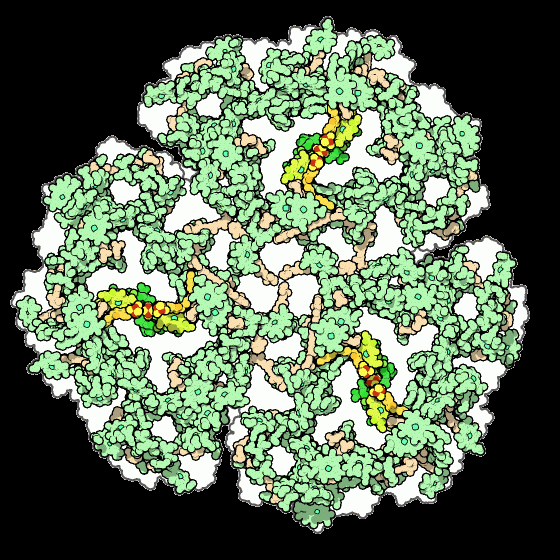The "best" IPCC AR6 climate scenario assumes currently nonexistent carbon removal technology and linear growth in said nonexistent carbon removal efficiency as the nonexistent technology "matures"
even if the technology exists, liberals will be stuck figuring out how to pay for it
perhaps the third world should rent the service of being less underwater
yeah, but then to keep the offset going, you gotta chop down those trees and throw them in a hole deep enough that the CO2 from decompositon can't make it back into the atmosphere, then plant more trees. but remember not to produce any CO2 doing this forestry work or else it's for nothing anyways
Indigenous Humans (and also present humans) have massively shaped the ecology and climate of this planet to its benefit (and our detriment). See forest gardens in the pacific northwest as an example.
That suggests the forest gardens were not only deliberately cultivated by Indigenous gardeners, but also remained resilient in the face of dominant local flora long after people left the scene, the researchers report today in Ecology and Society. The mix of different species was probably key to their persistence, Miller says: “There’s less open niche space, so it’s harder for new species to come in.”...Other researchers say the findings could help boost the case that Indigenous knowledge has an important place in conservation efforts. “Anthropologists and archaeologists have been arguing in favor of this, but there’s been a lot of resistance from ecologists over the past 20 years,” says Patrick Roberts, an archaeologist at the Max Planck Institute for the Science of Human History who was not involved in the research. This study, he says, is an important piece of evidence showing human modification can add value to ecosystems.
There is nothing stopping us from consciously designing future cities in and around forest gardens. Reforesting the amazon. And finding ways to reverse acidification in the oceans. But that's not profitable nor valuable right now.
Stuff like re-greening deserts is helpful too right? Turn them into carbon sinks
fucking hexbear ate a huge post on the Three-North Shelter Forest Programme | article. My point was that deliberate projects of reforestation can absolutely change or mitigate climate change and other risks. But Capitalist Ruling Class are not about to tell YOU that.
I want to turn my backyard into a horticulture garden with fresh foods and native plants. And I just wish i had the green thumbs, know-how and time.
If you have few things tying you down, I would look into WWOOFing for a Summer or else trying to get a seasonal production job at a green house (ideally on a vegetable farm). Or if you have the money to kill UC Santa Cruz has a really cool organic farming apprenticeship program. Which has been my dream if I win the lottery or something.
So we'd be making our own oil? Somebody tell the oil racketeers we found the next fossil fuel market to expand into
Love to assume infinite growth in tech. Hell, it's my 2nd favorite thing to believe in infinite growth about. Good thing Moore found that natural law or whatever.
Pretty weird that emissions have still been increasing over time, I thought every nation in the world signed an agreement to work on that. Oh well, at least we can imagine a scenario where a new climate agreement halves emissions in the next 10 years.
Does it also include unicorns eating all the greenhouse gases and farting them out as rainbows?
Climate scientists are fucking dorks. Yeah they do good work and this and that, and then they go on public radio to talk about how we as individuals could also do stuff to uhh...feel important or something
But anyways that recent UN report basically stated that we've locked in at least a couple degrees warming by now. But keep huffing on that fossil fuel fume thinking that it's really about job creation at the end of the day
I have to huff fossils fumes all day, can confirm this is not true. I feel worse
I'd rather drink an Adrenochrome shit slurry than cleanse my sinuses out with gasoline straight from the pump fam
love to pin all my hopes on a technology that doesn't exist
Climate scientists: "Sure, it looks bad. BUT what if we had access to magic?"
Any sufficiently simplistic magic is indistinguishable from technology!
As if we wouldn't use time travel to fuck up the planet centuries before we got around to it.
Politicians: We believe in science! And look, science says it's all going to be okay!
can't wait for the Positive Emissions to continue rising for another 20 years instead of that graph
A friend here sent me this post to comment on so your friendly hexbear geologist/climatologist is back!
This is a good post and graph but I would like to add that it is not true that carbon removal technology and processes do not exist. We already have and understand THE key process which we will use to sequester carbon (long term, if we ever actually start doing so in the first place at large scale). I’m so confident this will be the process humanity uses that I would bet my life on it.
The only issue we have is expediting this specific geochem process.
So are you more optimistic than most here when it comes to fighting climate change then?
No lol I’m even more depressed because I know if we had the funding for it we could almost certainly address this and be on the course to carbon sequestration in 20 ish years
Can you comment on the impact of the ocean acidification and its negative impact on biological production of CaCO3? Also, any thoughts on ways in which biological functions could be leveraged (or even modified) to speed up the process? (Synthetic biology is a longtime fascination of mine.)
Seeding the southern sea with iron to induce rapid blooms seems to be the most promising in terms of long term biological storage. Obviously replanting our forests as well but a mature forest is typically carbon neutral rather than carbon negative
In regards to ocean acidification yeah we are in pretty rough shape but that’s not my area of expertise
I also have background in Earth science. Sure silicate weathering can drawdown atmospheric CO2, but not at the scale necessary, or envisaged on the SSP1-1.5. All the silicate rocks on earth's surface takes out 0.13 Pg C/yr. Humans are releasing 15 PgC/yr. You need a carbon sequestration plants/facilities that remove 100x more C than all exposed silicate rocks on Earth's surface, and somehow find the energy to power the sequestration facility(ies) that is not emitting extra C to the atm
Yeah that’s why it’s still a bit far away in terms of until wide scale utility. We don’t need to remove more than 100x the amount, we need to accelerate the rate of carbon uptake 100 times which sounds daunting but in no way is not possible given our current understanding of how the geochemical process actually works.
You can supplement carbon capture by planting a forest and hanging fossil fuel execs from the trees.
what is an 'artificial carbon removal? does planting trees count?
Shit like this. Will it work? Possibly. Will it be used as a crutch that lets us do whatever we want without actually reducing emissions? Definitely.
Headline: Carbon Capture! Hope!
Buried in the article: "Because the plant currently uses some natural gas, by the time the fuel it produces has been burned it has released a half-tonne of carbon dioxide for every tonne removed from the air. That gives it a carbon footprint 70 per cent lower than a fossil fuel, he said.
That footprint would shrink further if the plant were all-electric. And if it ran on wind- or solar-generated electricity, the fuel would be almost carbon neutral."
Almost maybe carbon neutral-ish, in the future, maybe. :yea:
Well duh, we have to burn it! How else could we monetize saving the planet?
Pretty sure carbon scrubbing tech does exist? Not that it's effective yet but it does exist
They exist, but not in a scale that is able to reverse and sunk in 1/3rd of cumulative carbon emitted to the atmosphere since the preindustrial revolution












